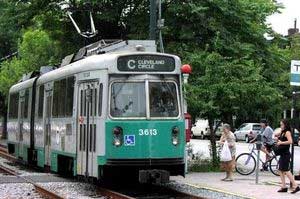
Board member recuses herself from vote
By Andrew Firestone
Progress on the Green Line Extension hit another snag last Wednesday after a state official recused herself during a vote to extend the rail designers’ contract.
The surprise led members of the Somerville Transportation Equity Partnership (STEP) to say they were “frustrated” with what they perceived as a lack of honesty from state transit officials on a $24 million contract extension.
STEP Executive Director Ellin Reisner said after the recusal, that the contract extension was “not a transparent process.”
The failure to vote on the contract extension of Vanasse Hange Brustlin (VHB) extension was due to a conflict of interest from board member Liz Levin, who had previous indirect professional relationships with some of the contractors. Because of Levin’s recusal, the Board of Directors could not reach a quorum of four.
This adds yet another delay in a decades-long fight to bring the Green Line through Somerville. The board’s next scheduled meeting is September 7.
The design stage of the extension project currently is finished with preliminary engineering, and transit planners sought the extension so the design could go to the 30 percent build stage; at which point the most important decisions in design have been made.
“Even if they were going to do a sole force contract, people would have liked to have seen what was in the scope,” said Reisner “And that did not happen.”
STEP member Wig Zamore who also attended the meeting said that, while the quorum issue was “absolutely no one’s fault at all,” there were a few doubts that were brought up before the failure to vote. “Nobody in the public had seen the request for proposal for the next piece of Green Line work,” he said. “And it turned out the board of directors had not seen the list of subcontractors either.”
Planner Steve Woelfel, who proposed the contract modification to the Board of Directors said it was “a little unusual” that they would go through this procurement process instead of another bid, according to STEP member Ken Krouse. “Those of us who were there expressed concern that the contract was not available for anybody to see publicly before the vote,” said Krouse. “Some of the board members shared that concern.”
Civilian engineer Steve Kaiser said that he felt the VHB’s no-bid situation made the state-run process appear without credit. “If somebody gets their foot in the door, and gets favoritism, and then gets the contract renewed without competition, then there’s a sense that the process is being unfair.”
He added, “nobody actually came out and said ‘we should actually re-bid this whole thing’ because that would actually mean extensive delays.”
Zamore and others were not convinced that VHB had sufficient experience to design the project successfully, evidenced by a director’s request for a list of 10 urban projects similar to Somerville.
“We’re hopeful that the MassDOT board will take up the Green Line on matters expeditiously, and that they will make sure that they’re satisfied as board members that the team being put together has sufficient experience at light rail and especially station-to-station area design, because that’s how you make sure stations are fully utilized by the population.”
An urban planner, Zamore noted that the designs for Green Line Extension were complicated by the intensive connections needed for pedestrians, bikers and users of other public transportation. “That’s not something that a team that lacks urban design light-rail can do. They simply can’t do it. They don’t have enough experience.”
MBTA spokesman Joe Pesaturo said the contract extension “is considered by most people to be a routine amendment of the original 2007 contract,” which was competitively bid. Pesaturo also noted that Levin’s withdrawal from the meeting “did not come as a surprise,” due to her experience working with urban development in the past. He also intimated that “the planners do not feel [the failure to vote] will impact the schedule” of implementing the ‘T’.
Pesaturo said the current price-tag on the entire project stands at $954 million.
While Reisner, Kaiser and Zamore said they believed there should be further oversight for VHB, whom they are not fully confident have the experience to handle design of such a track in such a densely populated urban area, Pesaturo said the state’s planners had full confidence in them. “They have a wealth of experience along with the seven other sub-contractors on the contract,” said Pesaturo.
“We’re not looking for something gold-plated at all, but we need it to work,” said Zamore.















Reader Comments